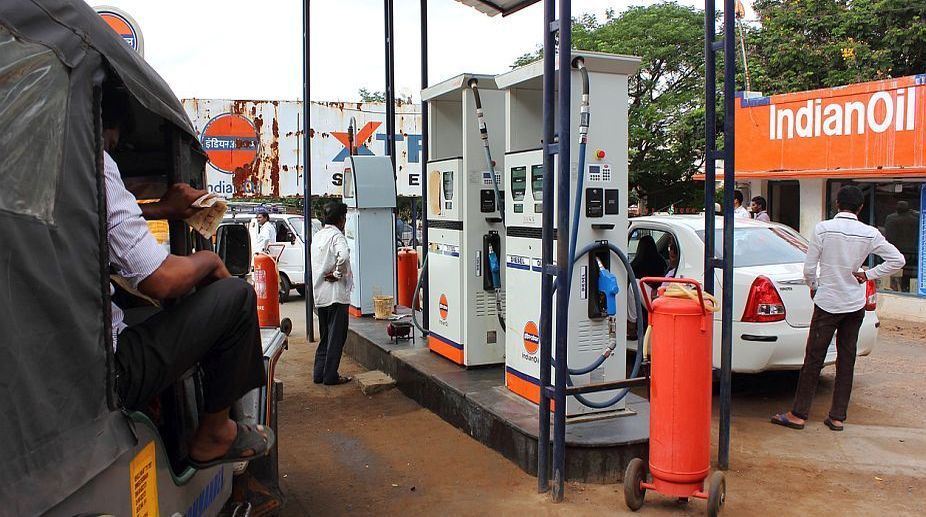BJP harps on Hindutva wave ahead of Ram Navami
With Ram Navami just days away, the BJP in West Bengal has intensified its Hindutva rhetoric, signalling a clear shift towards religious polarisation ahead of the 2026 Assembly elections.

(Photo: Getty Images)
Since a steep hike in petrol and diesel prices could have an adverse fallout for the BJP ahead of elections, the Centre has asked oil marketing companies to ensure that the retail price of petrol does not exceed Rs 75 a litre in the national capital and in other states as well, according to sources.
Senior government officials said they have not issued any formal letter to this effect to the oil marketing companies, but since the government holds the largest stake in the companies it has exercised its right to control the prices.
Advertisement
Hence, the companies have been asked to hold back prices even if global crude prices continue to spiral upwards.
Advertisement
Finance Secretary Hasmukh Adhia had earlier stated that the government is not going to review duties on petrol and diesel as of now. A senior official said the Finance Ministry in order to meet its fiscal deficit and revenue targets is not going to touch duties at all.
But since global crude prices are increasing and this is affecting consumers the decision to cap the retail product price would be the best solution, he added. The government has asked the OMCs to bear the losses for the time being, if crude prices soar.
Officials, however, added that they hope crude prices come down providing the needed cushion to OMCs and these controls will then no longer be imposed. The price of petrol stood at Rs 73.83 per litre while diesel was priced at Rs 64.69 a litre in the national capital on Monday.
Crude oil prices have been rising for the past month with Brent crude soaring to above $70 per barrel level. Reports of Western military action in Syria and falling global oil inventories have further supported the crude rally.
Saudi Crown Prince Mohammed bin Salman has already linked his expectation of higher oil prices of $80 with the timing of the initial public offering of the world’s largest oil company Saudi Aramco later this year. Also, OPEC struck a deal to curb production as a way to reduce oil supplies and support prices.
Prime Minister Narendra Modi has also urged oil producing nations to adopt “responsible pricing”. “We need to move towards responsible pricing that will balance the interests of producers and consumers,” Modi said in his inaugural address at the 16th International Energy Forum (IEF) in New Delhi last week.
Transparent pricing of oil and gas was necessary to serve humanity, as a large number of people still had no access to energy, he said, adding that artificially distorting the price was self-defeating.
The oil retailers switched to daily price revision from a fortnightly pricing system in June last year as the government sought to further the pricing reforms in the sector when prices remained subdued. But the system itself has created bigger problems for the government as constant increase in global prices is pushing up retail petrol and diesel prices daily.
Last week, Dharmendra Pradhan, Oil and Gas Minister, said, “The Centre and states bank on tax revenues to meet developmental needs. Forty two per cent of collections from excise duty (on petrol and diesel) go to states and the remaining 60 per cent is used to fund the Centre’s share in development schemes in states.”
The government raised excise duty nine times between November 2014 and January 2016 to shore up finances as global oil prices fell, but then cut the tax just once in October last year by Rs 2 a litre.
PTI adds: Three major public sector oil companies today announced that they would be distributing 70,000 LPG connections in Gujarat on April 20 to households living Below Poverty Line (BPL).
Advertisement
With Ram Navami just days away, the BJP in West Bengal has intensified its Hindutva rhetoric, signalling a clear shift towards religious polarisation ahead of the 2026 Assembly elections.
Taking a leaf out of the chief minister and the Trinamul Congress chairperson Mamata Banerjee’s book, her nephew and party’s national general secretary Abhishek Banerjee today held a virtual meet with party leaders on Saturday.
In a shocking revelation that threatens to undermine the integrity of West Bengal's electoral process, allegations of widespread duplicate, ghost, and dead voters have surfaced, casting a dark shadow over the state's upcoming elections
Advertisement
